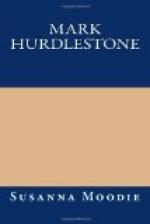At this critical juncture, Mark Hurdlestone, generously, as all the world thought, came forward, and offered her his hand; inviting her, in the most delicate manner, to share his splendid home and fortune.
His disinterested offer, at such a time, filled Elinor with respect and gratitude, but she did not love him; and, trembling and irresolute, she knew not how to act. She had but one relative—an uncle, in India—who had never written to her mother since her father died upon the scaffold. Whether this uncle was still living, was married, or single, she could not ascertain. To him, therefore, it was useless to apply. She had no home—she was at present dependent upon the bounty of a stranger, who could ill afford to be burdened with an additional member to her already large family. What could she do? She consulted that friend; and the worthy woman strongly advised her to accept the Squire’s offer, wondering, all the while, how she could, for one moment, think of a refusal. So it was all settled; and Elinor reluctantly consented to become Mark Hurdlestone’s wife.
Thousands in her situation would have done the same. But we must blame her, or any other woman, whatever her circumstances may be, who consents to become the bosom-partner of a man she cannot love. Miserable are such unions; from them flow, as from a polluted stream, all the bitterest sorrows and ills of life.
Young maiden, whosoever you may be, whose eyes glance at this moment on my page, take the advice of one who has been both a happy wife and mother: never sacrifice the best and holiest affections of your heart on the sordid shrine of wealth or worldly ambition. Without reciprocal love, the heart becomes a moral desert How can you reasonably expect to receive that from another, of which you are destitute yourself? Will the field that never was sown yield to the possessor a plentiful harvest? I do most firmly believe, that to this want of affection in parents to each other may be traced the want of the same feeling in children towards their parents. If a woman hates her husband, her offspring are not very likely to feel a strong attachment to their father; for children inherit, in a strong degree, not only the disposition of their parents, but their mental and physical peculiarities.
A virtuous woman will rarely place her affections upon an unworthy object if she be true to herself and the education she has received; and if she cannot consent to encounter a few trials and privations for the sake of the man she loves, she is not worthy to be his wife.
The loving and beloved partner of a good man may be called upon to endure many temporal sorrows, but her respect and admiration for his character will enable her to surmount them all, and she will exclaim with pious exultation,—“Thank God! I have been happy in my choice. His love is better to me than gold, yea, than much fine gold!”




